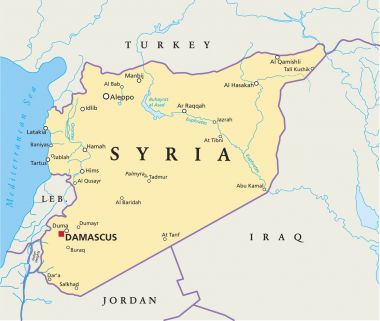In Syria, churches come together to give sanctuary to earthquake survivors

"Death and grey dust were everywhere you can see," says Leyla Samar. "Death surrounding me. Buildings flattened."
Speaking over a disrupted connection, Leyla, a food aid worker with Open Doors' Centres of Hope in Aleppo, struggled to find the words for what she saw as she entered the city.
"People just standing in the streets by their cars," she says. "They say, 'This car, this is my home now.'"
11 years of bombing and shelling in Syria's civil war left the city of Aleppo with cracked, unstable masonry and a crumbling infrastructure. Social media footage shot during the quake - verified by the BBC – shows whole apartment blocks swaying and collapsing as families run screaming from beneath them.
Eyewitnesses now describe a paralysis of terror in the city. A series of strong aftershocks left people too frightened to re-enter those buildings left standing.
"I witnessed another quake this afternoon," Leyla told journalists. "People everywhere are now so filled with fear. Our urgent need is for every single building to be assessed, for safety, before anyone can go back indoors. But there is no support for that now."
The quake struck at 4am on Monday. Those who were swift enough to leave their homes found themselves in freezing night-time temperatures with no warm clothing or shoes.
As the city enters its fifth day of mourning, volunteers and church workers are racing to source food, blankets and hygiene kits. Open Doors' Centres of Hope partners are now distributing aid in seven locations in Aleppo and Latakia, with over a thousand people in one church alone.
Outside Aleppo, vast swathes of north west Syria are still unreachable by phone. The region has been embroiled in the civil war, and for those areas under the control of opposition forces, only one small crossing on the Turkish border exists at all as a road to bring in aid.
'Rooted more deeply in their faith'
Monasteries and churches of all denominations – Maronite, Eastern and Greek Orthodox, Catholic and many others – are throwing open their doors to deal with mass homelessness.
Church leaders are emphasising that all are welcome, regardless of faith, nationality or politics.
"It's a desperate humanitarian situation," Chaldean Catholic Archbishop, Antoine Audo, told reporters. His residence is housing around 50 people, including the elderly and tiny babies. Others are sheltering at the Maronite Cathedral of St. Elijah; 1,600 at the Greek Orthodox bishopric; and over 2,000 at the Franciscan Convent in Aleppo.
"There is no electricity, there is no fuel, the winter is very harsh, and it is cold inside and outside. There is so much poverty," Archbishop Audo says.
Open Doors' Centres of hope are so far reaching around 5,400 people. They are distributing two meals a day – mostly sandwiches – and providing blankets and a place to rest. Volunteers and clergy are listening as people pour out their experiences.
"We are finding so many people are looking at this as a sign to root themselves more deeply in their faith," Leyla Samar says.
"One family, a lady living on the fifth floor of her block, with her elderly mother and son, told us how they ran as the building was collapsing round them. Her son, who was an unbeliever, was crying out his thanks to God as they escaped."
'Strengthen what remains'
The earthquake is a particular blow to those working to rebuild the Syrian church.
Syria holds precious significance in Christianity – both Antioch and Damascus were vital centres for the early church. Aramaic, the language Jesus spoke, is still spoken in places.
But as ISIS began attacking and seizing towns in 2013, the mass displacement of Christians began.
Wherever ISIS seized control, Christians were ordered to convert, to pay the jizya religious levy, or face death. Hundreds of Christians - including bishops of the Greek and Syrian Orthodox church – were kidnapped.
Ibrahim Najjar, a Christian community worker with the Centres of Hope project supported by Open Doors, says the lasting effects of the horror wrought by ISIS are now compounded by the continual danger of moving about wrecked towns and cities.
"The feeling of uncertainty and isolation is increasing," he told journalists by phone. "Now, as they see, even their own houses are not safe enough. They feel that they live in houses that are easily cracked and might fall down. So their sensation of being insecure and unsafe is increasing."
Pastors and church workers are praying that the tiny Christian community will be able to withstand the exhaustion and uncertainty they face.
"Our goal is to strengthen what remains. We need to help Christians, not only with relief support, but we also need to think of the long term," says Ibrahim Jaffar.
"Just as our church buildings have acted as robust refuges for Aleppo's population, pray that Christ's body here will also be strong and resilient.
"Syria needs the service and resilience of its Christian minority, more than ever."











